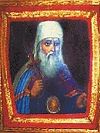

| Previous day | Next day |
| Old Style
June 10
|
Saturday |
New Style
June 23
|
|
4th Week after Pentecost.
Tone 2.
Fast of the Holy Apostles. |
Fish, wine and oil allowed.
|
![]() Hieromartyr Timothy, bishop of Prusa (ca. 361-363).
Hieromartyr Timothy, bishop of Prusa (ca. 361-363). ![]() Uncovering and translation of the relics of St. Basil, bishop of Ryazan (1609).
Uncovering and translation of the relics of St. Basil, bishop of Ryazan (1609). ![]() Synaxis of the Saints of Ryazan.
Synaxis of the Saints of Ryazan. ![]() St. John, metropolitan of Tobolsk and all Siberia (1715).
St. John, metropolitan of Tobolsk and all Siberia (1715). ![]() Synaxis of the Saints of Siberia.
Synaxis of the Saints of Siberia.
Martyr Alexander and Virgin-martyr Antonina, at Crodamon (ca. 313). St. Theophanes, monk, and St. Pansemne, former harlot, of Antioch (369). St. Bassian, bishop of Lodi in Lombardy (409). St. Silouan of the Far Caves in Kiev (13th c.-14th c.). Blessed Cosmas, fool-for-Christ, of Verkhoturye (1706).
St. Asterius, bishop of Petra (4th c.). St. Canides, monk, of Cappadocia (ca. 460).
Repose of Elder Nahum of Solovki (1853), Schemamonk Sergius of Valaam (1860), and Schema-abbess Tamar (Mardzhanishvili) of the St. Seraphim–Znamensky Skete (1936).
Thoughts for Each Day of the Year
According to the Daily Church Readings from the Word of God
By St. Theophan the Recluse

Saturday. [Rom. 6:11-17; Matt. 8:14-23]
To one of those who wanted to follow the Lord, He said: The Son of man hath not where to lay his head, and to another who wanted first to bury his father, He said to leave the dead; others will bury him, but you follow Me. This means that he who wants to follow the Lord should not expect any comfort on the earth after following Him, but only deprivations, needs and sorrows; and it means that worldly cares, even the most legitimate, are not compatible with following Him. It is necessary to decisively renounce everything, so that nothing attaches you to the earth, and then to condemn yourself to many sufferings or your cross. Having thus prepared yourself, follow the Lord. This is the direct will of the Lord! But who is this commandment for—only the Apostles, or for all Christians? Let each figure it out himself. Deny yourself and take up the cross. Was this said to everyone? Love the Lord more than father and mother, brothers and sisters, wife and children—is this said to everyone? The conclusion is clear. What should we do? One time the Apostles posed the same question to the Lord, and He answered them, The things which are impossible with men are possible with God (Luke 18:27).
Articles
 Hieromartyr Timothy the Bishop of PrusaThe Hieromartyr Timothy, Bishop of Prusa (Bithynia), received from the Lord the gift of wonderworking because of his purity and sanctity of life. |
 St Basil the Bishop of Ryazan |
 Synaxis of the Saints of Ryzan |
 Synaxis of the Saints of SiberiaSynaxis of the Saints of Siberia |
 Venerable Theophanes of AntiochSaint Theophanes of Antioch was the son of pagans. At a youthful age he entered into marriage, but after three years his wife died. |





